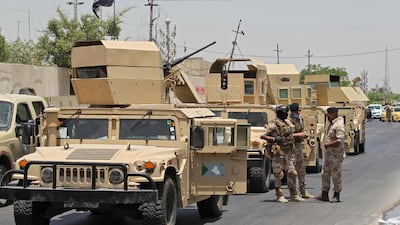An attack on a funeral procession in northern Iraq has claimed the lives of at least 11 people, Iraq’s military have said.
The military said on Friday the “terrorist” attack in Yathrib district of Salahaddin province resulted in a “number of victims” but did not provide specific figures.
An Iraqi security official said 11 people had been killed, among them police and civilians, and that armed militants had opened fire on the crowd.
The official, who spoke on condition of anonymity, said the attack had been perpetrated by ISIS. The death toll could not be immediately confirmed but local officials said a number of the wounded were in critical condition and several had been rushed to hospital in Baghdad.
The military said it will provide details once an investigation is complete, but initial reports suggest a large crowd of mourners had gathered in the open and had then come under sniper fire.
Iraqi security forces said the attack stopped after a surge of military personnel and local fighters went to the scene.
Northern Iraq has been a hotspot for ISIS activity since their territorial defeat in 2017 by Iraqi security forces with assistance from the US-led coalition. Iraqi forces routinely carry out anti-ISIS operations in the rugged mountainous northern region and the deserts of western Iraq where they are known to be holed up.
Local tensions
ISIS attacks have abated in recent years but continue in these remote areas north of Baghdad where security forces are often the target of ambushes, raids and IEDs.
But Salahaddin has in recent years been fairly secure and attacks on the capital of the province, Tikrit, are rare.
Close knit Sunni tribal communities frequently cooperate with an array of different Iraqi security forces, including the Iraqi army, local police and in some cases, Iran-backed militias.
But the presence of Iran-backed groups has proven divisive.
In Yathrib, Iran-backed militia Asaib Ahl Al Haq has a strong presence, which according to a recent study by the German Institute for Global and Area Studies, has exacerbated tensions within the local Sunni majority community.
The US has sanctioned the group for grievous human rights abuses, including the killing of thousands of Sunni civilians during the years of US occupation and the war on ISIS and since 2019, hundreds of Shiite protesters.
Analysts also warn that having such a large number of security force groups, from militias to local police and the army, often leads to coordination problems, allowing ISIS to infiltrate between different units.
The deterioration of security north of the Iraqi capital means that at times, the terrorists have been successful striking within Baghdad, although attacks in the capital are far less frequent than in the past.
At least 30 people were killed last week in a suicide bombing in the Baghdad suburb of Sadr City. The attack was claimed by ISIS.

